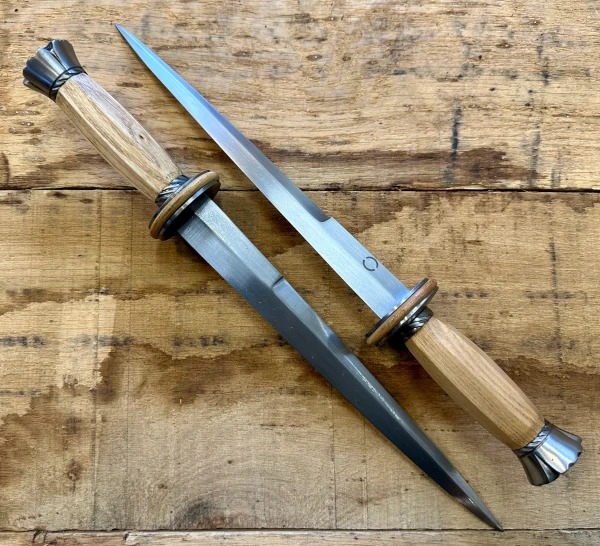I have just read a book called “Traditional Ninja Weapons” by Charles Daniel. Yes, there are a few books out there with “ninja” in the title that are worth reading.
Today, I want to look at just one of the ideas in this book.
The author suggests that most weapons can be divided into three general classes as either “battlefield”, “duelling” or “surprise self‑defence”.
Battlefield Weapons
Battlefield weapons are intended for uses when true one‑to‑ combat is rare. Often these weapons are offensive orientated since since armour, shields and/or terrain are used for protection.
Daniel lists “axes, spears, maces, giant swords and halberds” as examples.

Battlefield weapons are often distinguished by their reach or range. Many are designed for open terrain.
Battlefield weapons are often specialised, optimised for use against certain targets and relying on differently armed comrades to handle other threats.
While Daniel talks about traditional/historical weapons, these criteria continue to apply to more modern battlefield weapons.
Duelling Weapons
Duelling weapons are usually intended for one‑to‑one confrontations and usually, although not always, fight like against like. The duel is distinguished by the feature that the combat will usually be subject to some rules and restrictions.

Some duelling weapons are variants of battlefield weapons. Weapons similar to duelling weapons may appear on the battlefield, but they are often backup or secondary weapons.
Daniel gives the katana, jo staff and rapier as examples.
Surprise/Secret
Daniel defines “surprise self‑defence” weapons as including those that the opponent does not learn about until too late.
I prefer to call this class “surprise/self‑defence” since some surprise weapons are not defensive and some self‑defence weapons are not used covertly.
Daniel gives “nunchaku, butterfly knives, walking sticks, weighted chains and many of today's "ninja" weapons” as examples.

Weapons of this class tend to be used as short ranges, be convenient to carry and may be concealable.
So what? you might ask.
This is an interesting concept, since it encourages us to look at weapons and their use within the context of the environment they were intended for.
This explains George Silver's comments:
The short staff or half pike, forest bill, partisan, or glaive, or such like weapons of perfect length, have the advantage against the battle axe, the halberd, the black bill, the two handed sword, the sword and target, and are too hard for two swords and daggers, or two rapier and poniards with gauntlets, and for the long staff and morris pike.The long staff, morris pike, or javelin, or such like weapons above the perfect length, have advantage against all manner of weapons, the short staff, the Welch hook, partisan, or glaive, or such like weapons of vantage excepted, yet are too weak for two swords and daggers or two sword and bucklers, or two rapiers and poniards with gauntlets, because they are too long to thrust, strike, and turn speedily. And by reason of the large distance, one of the sword and dagger-men will get behind him.The Welch hook or forest bill, has advantage against all manner of weapons whatsoever.Yet understand, that in battles, and where variety of weapons are, among multitudes of men and horses, the sword and target, the two handed sword, battle axe, the black bill, and halberd, are better weapons, and more dangerous in their offense and forces, than is the sword and buckler, short staff, long staff, or forest bill. The sword and target leads upon shot, and in troops defends thrusts and blows given by battle axe, halberds, black bill, or two handed swords, far better than can the sword and buckler.The morris pike defends the battle from both horse and man, much better than can the short staff, long staff, or forest bill. Again the battle axe, the halberd, the black bill, the two handed sword, and sword & target, among armed men and troops, by reason of their weights, shortness, and great force, do much more offend the enemy, & are then much better weapons, than is the short staff, the long staff, or the forest bill.
Weapons that perform well in private fights and those needed on a battlefield, differ in their desirable properties.
For example, it is now obvious why martial arts that have become sports often perform poorly when the sportsman has to defend themselves. There are no proscribed tactics or targets, no notification that attacks may begin.
Similarly, some techniques originally intended for the battlefield do not work in other contexts.
Skill in grappling may be decisive in a one‑to‑one encounter, but in other situations rolling on the ground will just give other enemies an easy kill.